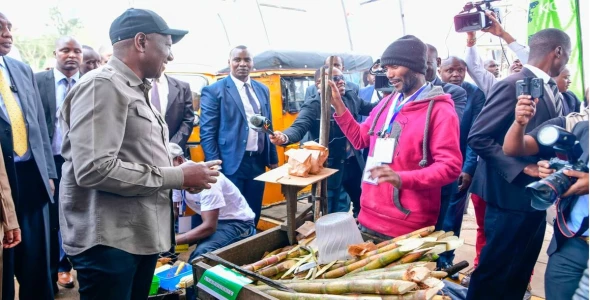Follow us on Facebook
Blog Details

- 17 Oct, 2022
- 1336 Views
- Source : KABUI MWANGI
Why six Kenyan promising tech start-ups fell in quick succession
Difficult market conditions as well as funding hitches have wiped out at least six Kenyan tech start-ups this year alone, hurting the country's vision to become the Silicon Savanah of Africa.
Kune Foods, Notify Logistics, WeFarm, BRCK, Sendy and Sky-Garden have shut down either in full or part of their business in quick succession in just four months to October.
This comes months after other startups among them BRCK, which was providing free WiFi in public transport and had funding from Facebook, were wiped out by the Covid-19 wave.
This month alone has seen two tech firms bow out of the Kenyan market, pointing to continuing deterioration of the sector.
Anza Now CEO Bobby Gadhia, whose initial tech firm PC World Limited collapsed in 2016 after being in the game for 21 years, blames entrepreneurs’ above-average ambitions when starting for the rapid collapses.
“Most start-ups and entrepreneurs are emotional and over-optimistic about their business ideas. They start these ideas without proper planning and they are disillusioned by the success of Silicon Valley,” says Mr Gadhia.
In his view, the majority of tech investors are driven by greed for quick money and hence do not make proper cases for their businesses before starting.
“The tech sector is one of the most stressful and demanding that one can ever venture into. You have to possess balls of steel to navigate and survive. It is not for the faint-hearted.”
Online e-commerce platform SkyGarden is the latest casualty in this growing list.
SkyGarden earlier last week sent termination notices to staff ahead of the planned shutdown after five years of business.
“Five years after launching, Kenyan e-commerce platform Sky.Garden, may have to stop operations following a failed funding round,” the company announced.
The revelation came shortly after Sendy’s announcement to close down its retail and supplier platform known as Sendy Supply in a move that saw 20 percent of its workforce axed. The firm attributed the move to a funding drought that had hit Kenyan start-ups, blaming developed economies for raising the cost of lending.
“We have paused the Sendy Supply services, our solution that provides a platform for general retailers to purchase stock at competitive prices from multiple suppliers and manufacturers,” said Sendy founder and CEO Mesh Alloys.
In September, Kenyan retail-tech startup Wasoko, which provides delivery services for essential goods, announced its relocation to Zanzibar following the launch of Wasoko Innovation Hub on the island in partnership with the Zanzibar government.
“As a pan-African tech company, Wasoko has been looking for a location where we can bring together the best talent from across the continent and beyond to innovate and develop new products and services for our customers,” said Wasoko founder Daniel Yu.
The retail firm had been born in Kenya in 2016 trading then as Sokowatch.
Notify Logistics and WeFarm called it a day in July, with the former citing inability to continue breaking even due to high operation costs while the latter attributed its decision to tough market conditions that had made it difficult to scale.
Notify was running a rent-a-shelf model which leveraged on leasing space before renting it out to a stream of small enterprises that were unable to afford a physical outlet on their own. The business had run for barely five years.
“It has become extremely hard to maintain, and the thing is we were getting unsustainable with the vendors,” one of the firm’s directors, Helen Nyambura, had said.
WeFarm was running a shop in the form of a mobile application which had been developed to help farmers buy products online as well as share reviews and information with each other.
“We have taken the difficult decision to discontinue one of our services: WeFarm shop. While our shop has seen incredible demand and growth over the past nine months, current market conditions make this avenue a difficult one to set up and to scale,” WeFarm’s Director of Growth Sofie Mala told media outlet CIO Africa at the time of closure.
The business had been in operation for eight years having been founded in 2014.
The first to close down in June was the food-tech venture Kune, founded by Frenchman Robin Reecht. The start-up bowed out after failure to raise Sh30 million in investor funds at the height of rising operational costs.
"With the current economic downturn and investment markets tightening up, we were unable to raise our next round," Mr Reecht had said in a statement.
Kune also revealed that it had failed to raise finances from investors to boost its operations, signifying a lacklustre tendency by venture capitalists especially from the developed world to push forth investments due to fears of recession and interest hikes.
An FT annual ranking of Africa’s fastest-growing companies conducted in March showed that Kenyan firms, leveraging on technology to offer products and services posted a thriving record, with two making it to the top of the continent.
Interestingly, Wasoko was then ranked the fastest-growing business in Africa in the FT survey trailed closely by yet another Kenyan brand known as Flocash.
Multinational tech giants including Microsoft, Amazon and Google have also raided local firms, offering fat salaries and attractive employment terms.
The continued bullish strengthening of the dollar has had devastating effects on earnings by local companies, as it makes it expensive for firms to make hard currency payouts.









